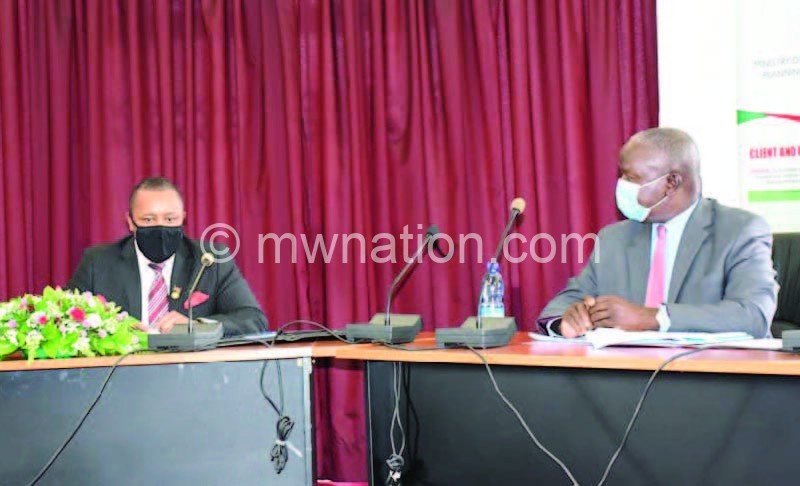Treasury must deal with errant officers
Vice-President Saulos Chilima has asked the Ministry of Finance to institute sanctions against controlling officers who fail to adhere to guidelines aimed at ensuring efficiency and professionalism in public finance management.
Treasury has since moved to review the Public Finance Management Act to provide sanctions for errant individuals. It has also set up an Inspectorate of Finance to carry out pre-audit payment transactions and certify payment.

Chilima, who is also Minister of Economic Planning and Development and Public Sector Reforms made the call on Wednesday when he met Finance Minister Felix Mlusu to understand the progress of ongoing public sector reforms in the ministry.
On his Facebook page, Chilima said the ministry has reformed areas aimed at establishing a functional internal audit system, configuring Integrated Financial Management Information System (Ifmis) to integrate all government accounts and ensure that payment systems are working efficiently.
He wrote: “One of the challenges that the ministry outlined is the lack of compliance by controlling officers to follow new measures and guidelines aimed at ensuring efficiency and professionalism in public finance management.
“I spoke strongly about instituting sanctions for those failing to adhere to the guidelines. I have since asked the ministry to consider putting in place systems that would track controlling officers who do not comply with the guidelines so that they are held responsible.”
Chilima applauded the ministry for establishing an Inspectorate of Finance within the Central Audit Unit to carry out pre-audit of payment transactions and certify payment vouchers in accordance with regulations.
“This is an important exercise that ensures that taxpayers’ money is being put to its intended use. We agreed that the ministry must continue to tighten bank reconciliation controls because this laxity is what facilitated Cashgate in 2013.
“In the same vein, I suggested that the new Ifmis must become functional at all levels, not just in 10 ministries and departments as it is the case currently. With the investments that have taken place in E-government, connectivity cannot be an excuse,” he added.
In an interview, Treasury spokesperson Williams Banda said while the current Act criminalises refusal to produce documents, it targets the office, but the review seeks to narrow it so that individual deviants are held personally.
Section 88 (1b) of the Act indicates that a person commits an offence who refuses to produce any records in his possession when required to do so.
Said Banda: “What the Ministry has done is to review the Act so that the loopholes are sealed. More importantly, in the submission, there is set up of an Inspectorate of Finance which aims at pre-auditing documentation.
“We are also exploring possibility of electronic bank transfers. On sanctions, that’s why we want to ensure that the law is amended and captures that. It is almost dine and we are just doing final consultations.”
He added that government is enhancing capacity on record management in conjunction with the National Archives and Record Management.
“The current law being reviewed was doing with the office, not the individual, so the new Act is looking at the individual, the actual person who fails to comply with guidelines within an institution or office,” said Banda.
On his part, Institute of Chartered Accountants in Malawi (Icam) executive director Francis Chinjoka Gondwe wondered whether there are internal controls against wanton abuse of resources, especially that the process involves managers, accountants and other officers.
He said Icam has a code of conduct which members are supposed to abide by, and deviants are disciplined with some paying fines, or being struck off from the register.
“We require that registered members of Icam abide by the code of conduct and also if a member goes outside the code of ethics, should be reported to Icam.





